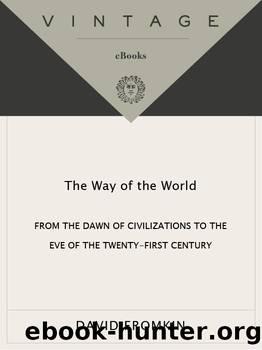The Way of the World by David Fromkin

Author:David Fromkin [Fromkin, David]
Language: eng
Format: epub
ISBN: 978-0-307-76605-2
Publisher: Knopf Doubleday Publishing Group
Published: 2012-10-30T16:00:00+00:00
The tiny Portuguese expedition led by da Gama was the first European force to reach India since that of Alexander the Great. In the intervening 1,800 years, India, like Europe, had experienced the rise and fall of great empires—among others, that of the Mauryas, just after Alexander, and that of the Guptas, which flourished as Latin Rome crumbled. Also like Europe, India often had to defend its civilization against nomad hordes, mostly from the north: White Huns, Mongols, Arabs, Turks, Tatars, and the like. Like Europe, too, India had witnessed religious conflicts and changes. Buddhism, though moving north and east to win converts throughout Asia, for reasons imperfectly understood had declined and disappeared in India, the land of its birth. The Muslim faith, brought by invaders and travelers from the Middle East and Central Asia, won over much of the country, while Jainism persisted, and Hinduism flourished as the creed of the majority.
In another major respect, however, India’s experience had been different from Europe’s for most of the time since their earlier encounter: starkly put, Europe had been poor, while India had been rich. This was a fact of life of which Vasco da Gama was made aware in unmistakable terms by representatives of the Samuri,2 the ruler of Calicut.
The merchants who represented the Samuri took a look at the gifts da Gama proposed to tender him—and burst into laughter. A dozen swatches of cloth, some clothes, a few strings of coral, a half-dozen washbasins, a bale of sugar, two barrels of butter—which must have gone rancid—and two barrels of honey: a meager offering, poor stuff, of inferior quality. Was the King of Portugal insulting the Samuri?
Da Gama smoothly explained it away: the gifts were from himself, a poor man, not from his great monarch. But the next day, when he appeared before the ruler, da Gama had no plausible response to the Samuri’s question as to why he had brought no gifts from his king.
Portugal’s goods could not successfully compete in the Indian market. The Muslim traders offered merchandise of superior quality and of a far wider range, including horses and copper from the Middle East, in exchange for the spices and jewels India could supply. This was not a problem on which Prince Henry and his successors had focused. For them, the hurdle to overcome had been to find out how to sail to the Orient. In the long years during which the Portuguese had been seeking a sea road to India, it seems never to have occurred to them that getting there was only the first of the challenges they would meet. Even with the aid of the Samuri, it was only with the greatest difficulty that da Gama and his crew conducted their trading activities.
In the years to come, the Portuguese discoverers would essay the sailing of the Pacific Ocean, and much else, but the age of reconnaissance was approaching its end. Driven by circumstances, Portugal once again was about to pioneer entry into a new era: an age of trade wars.
Download
This site does not store any files on its server. We only index and link to content provided by other sites. Please contact the content providers to delete copyright contents if any and email us, we'll remove relevant links or contents immediately.
| Africa | Americas |
| Arctic & Antarctica | Asia |
| Australia & Oceania | Europe |
| Middle East | Russia |
| United States | World |
| Ancient Civilizations | Military |
| Historical Study & Educational Resources |
Magic and Divination in Early Islam by Emilie Savage-Smith;(1533)
Papillon by Henry Charrière(1432)
Bohemians, Bootleggers, Flappers, and Swells: The Best of Early Vanity Fair by Bohemians Bootleggers Flappers & Swells- The Best of Early Vanity Fair (epub)(1409)
Ambition and Desire: The Dangerous Life of Josephine Bonaparte by Kate Williams(1389)
Twelve Caesars by Mary Beard(1315)
What Really Happened: The Death of Hitler by Robert J. Hutchinson(1163)
Operation Vengeance: The Astonishing Aerial Ambush That Changed World War II by Dan Hampton(1162)
London in the Twentieth Century by Jerry White(1147)
The Japanese by Christopher Harding(1133)
Time of the Magicians by Wolfram Eilenberger(1126)
Twilight of the Gods by Ian W. Toll(1119)
Lenin: A Biography by Robert Service(1076)
The Devil You Know by Charles M. Blow(1024)
A Social History of the Media by Peter Burke & Peter Burke(976)
Freemasons for Dummies by Hodapp Christopher;(964)
Napolean Hill Collection by Napoleon Hill(943)
Henry III by David Carpenter;(919)
The Rise and Triumph of the Modern Self by Unknown(913)
Richard III (The English Monarchs Series) by Charles Ross(908)
